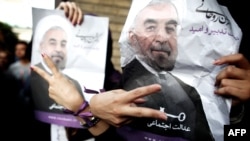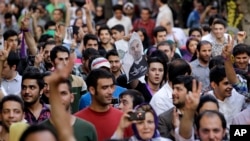Iran's interior minister, Mostafa Mohammad-Najjar, has declared moderate cleric Hassan Rowhani the winner of the nation's presidential election, in a surprise victory over the nation's ruling hardliners.
Rowhani - the favorite of reformists and a former chief nuclear negotiator - received close to 19 million votes out of nearly 37 million counted. He secured slightly more than 50 percent of the vote, eliminating the need for a runoff. His closest competitor, Tehran Mayor Mohammad Bagher Qalibaf, trailed far behind, with about 16 percent of the vote.
U.N. Secretary-General Ban Ki-moon congratulated Rowhani and encouraged Iranian authorities and the president-elect to play a "constructive role" in regional and international affairs.
The United States also congratulated the Iranian people for their participation in the election, with White House press secretary Jay Carney saying the Obama administration respects the vote. But Carney's statement pointed out that the election took place against what he described as "government obstacles and limitations," including a lack of transparency, censorship of the media and an intimidating security environment.
Carney said the U.S. hopes the Iranian government will heed its people's will and make choices that create a better future for them. He reiterated the U.S. willingness to engage Iran directly to reach a diplomatic solution to concerns over its nuclear program.
About 50 million Iranians were eligible to vote in Friday's election, putting the turnout at above 70 percent.
This is Iran's first presidential vote since Mr. Ahmadinejad's disputed re-election in 2009 spawned widespread protests and a bloody crackdown by the government. President Mahmoud Ahmadinejad was constitutionally barred from a third consecutive term.
Analysts say high interest in the carefully orchestrated campaign may have been due to Rowhani's candidacy.
As president-elect, Rowhani will prepare to take on an economy struggling with high unemployment and inflation and crippled by international sanctions over Iran's disputed nuclear program.
Excluding Rowhani, most of the six candidates vying for the presidency were considered hardliners loyal to the country's supreme leader, Ayatollah Ali Khamenei. Rowhani is also said to have a close relationship with Mr. Khamenei.
While the new president-elect has vowed to improve ties with the international community, the election outcome is unlikely to significantly alter Iran's relationship with the rest of the world, as major policy decisions rest with the supreme leader.
Rowhani - the favorite of reformists and a former chief nuclear negotiator - received close to 19 million votes out of nearly 37 million counted. He secured slightly more than 50 percent of the vote, eliminating the need for a runoff. His closest competitor, Tehran Mayor Mohammad Bagher Qalibaf, trailed far behind, with about 16 percent of the vote.
U.N. Secretary-General Ban Ki-moon congratulated Rowhani and encouraged Iranian authorities and the president-elect to play a "constructive role" in regional and international affairs.
The United States also congratulated the Iranian people for their participation in the election, with White House press secretary Jay Carney saying the Obama administration respects the vote. But Carney's statement pointed out that the election took place against what he described as "government obstacles and limitations," including a lack of transparency, censorship of the media and an intimidating security environment.
Carney said the U.S. hopes the Iranian government will heed its people's will and make choices that create a better future for them. He reiterated the U.S. willingness to engage Iran directly to reach a diplomatic solution to concerns over its nuclear program.
About 50 million Iranians were eligible to vote in Friday's election, putting the turnout at above 70 percent.
This is Iran's first presidential vote since Mr. Ahmadinejad's disputed re-election in 2009 spawned widespread protests and a bloody crackdown by the government. President Mahmoud Ahmadinejad was constitutionally barred from a third consecutive term.
Analysts say high interest in the carefully orchestrated campaign may have been due to Rowhani's candidacy.
As president-elect, Rowhani will prepare to take on an economy struggling with high unemployment and inflation and crippled by international sanctions over Iran's disputed nuclear program.
Excluding Rowhani, most of the six candidates vying for the presidency were considered hardliners loyal to the country's supreme leader, Ayatollah Ali Khamenei. Rowhani is also said to have a close relationship with Mr. Khamenei.
While the new president-elect has vowed to improve ties with the international community, the election outcome is unlikely to significantly alter Iran's relationship with the rest of the world, as major policy decisions rest with the supreme leader.










